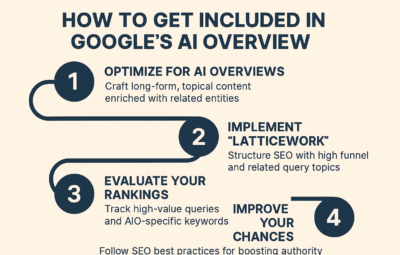SEO For Accounting Firms Does It Work And What Do I Need To Know?
- August 10, 2024
- Business Marketing
In today's digital marketplace, Search Engine Optimization (SEO) is the cornerstone of an effective online presence. For accounting firms, mastering SEO can be the difference between languishing in obscurity and being the go-to experts in the field. SEO is not just about being seen; it's about being seen by the right people at the right time. In this educational guide, we will delve into the transformative power of SEO and its significance in driving organic traffic to your firm's website, directly impacting the acquisition of new clients for your accounting services.
With an ever-increasing number of clients turning to search engines to find financial and accounting assistance, a strategic SEO approach is essential. It helps your firm appear in the search results for key terms and questions related to your services, allowing you to capture the attention of potential clients just when they need you the most. Furthermore, we'll discuss how leveraging SEO gives your firm a competitive edge, setting you apart in the crowded accounting industry. By optimizing content, building your online reputation, and ensuring your website caters to client needs and search engine algorithms, your firm can position itself as an industry leader. Let's get started on the path to SEO mastery and unlock the full potential of your online presence.
Conducting Effective Keyword Research for Accounting Services
Understanding the heart of SEO begins with keyword research. For accounting firms, keywords are not just about finding terms that are popular; they are about discovering the language your potential clients use to seek your services.
The Importance of Keyword Research in Reaching the Target Clientele
Keyword research is fundamental for accounting firms to reach the correct audience. It allows you to customize your content and online presence to align with the terms and phrases that your prospective customers are entering into search engines. By incorporating these keywords into your website, you can significantly increase your visibility and the likelihood of attracting high-quality traffic that can convert into loyal clients.
Steps to Identify Relevant Search Terms that Potential Clients Use
- Analyze your services and identify the main topics and terms related to your offerings.
- Consider the questions and concerns your clients have and how they might phrase them in a search.
- Examine the competition to see what keywords they are ranking for and determine how you can differentiate.
- Use long-tail keywords that are more specific and less competitive, increasing your chances of ranking well.
- Look for variations and synonyms of your keywords that potential clients might use.
Utilizing Tools and Resources for Keyword Research Specific to the Accounting Industry
A multitude of tools can assist with keyword research, from Google's own Keyword Planner to industry-specific resources that provide insights into the accounting market. Invest in a mix of free and paid tools to get a comprehensive view of valuable keywords. Such tools can provide search volume, competition levels, and even keyword trends that can inform your SEO strategy over time.
Remember that effective keyword research is an ongoing process. As the accounting industry evolves and client needs shift, so too should the keywords you target. Stay informed and be adaptable to maintain a relevant and authoritative online presence.
Implementing Content Marketing Strategies for Accountants
As an accounting firm, it's essential to not only understand SEO but also to know how to engage potential clients with compelling content. Content marketing is a critical component of SEO for accountants, as it drives organic traffic to your website and establishes your firm as a knowledgeable authority in your field.
Creating Valuable Content That Addresses Client Needs and Questions
Begin by conducting research to identify the common questions and concerns your clients have. Use this information to create content that provides clear, concise answers and valuable insights. This could be in the form of blog posts, industry whitepapers, or informative articles that are specifically tailored to the financial concerns of your target audience.
Tips on Consistency and Quality to Establish Authority and Trust
- Consistency is key: Keep a regular schedule for publishing new content. This shows your audience that you are a reliable source of information and helps to keep your firm top of mind.
- Maintain high quality: Each piece of content should be well-researched and accurate, reflecting the high standard of your services. Quality content will also encourage other reputable sites to link to your firm's website, increasing its authority.
How Content Marketing Supports SEO Efforts
Effective content marketing does more than attract eyeballs; it boosts your SEO by:
- Providing a continuous stream of fresh, relevant content, which search engines favor.
- Increasing user engagement on your site, signaling to search engines that your site provides valuable content, thereby improving your rankings.
- Encouraging backlinks from credible sources, which enhances your site’s authority and credibility.
Remember, content marketing is a long game. It’s about building lasting connections with your audience by providing them with the information they seek. The more value you provide, the more likely they are to choose your firm when they need accounting services.
Leveraging Local SEO Tactics for Accounting Firms
Local SEO is essential for accounting firms looking to attract nearby clients. By optimizing your online presence for the local searches your potential clients are performing, you can significantly increase the chances of them finding your firm when they need accounting services the most.
The Role of Local SEO in Attracting Nearby Clients
Local SEO is the key to connecting with clients in your immediate geographic area. By focusing on local search engine results, your firm can gain greater visibility among potential clients who are searching for accounting services in your locality.
Optimizing Your Google My Business Listing
One of the most powerful tools for local SEO is your Google My Business (GMB) listing. A well-maintained GMB profile can greatly enhance your firm's visibility in local search results and Google Maps. To optimize your listing:
- Ensure all information is accurate and up-to-date, including your firm's name, address, phone number, and hours of operation.
- Add high-quality photos of your office, team, and any relevant work to give potential clients a better sense of your firm.
- Collect and manage client reviews to improve your credibility and attract more local clients.
- Use relevant categories and keywords that help Google understand your firm's services.
The Importance of Local Citations and How to Acquire Them
Local citations, which are online mentions of your firm on other websites, play a vital role in local SEO. They help improve your search engine rankings and build trust with potential clients. To gather citations:
- Submit your firm's information to reputable local business directories.
- Ensure that your firm is listed in industry-specific directories such as accounting and financial association websites.
- Engage in community events and sponsorships that might offer online recognition.
- Keep your NAP (Name, Address, Phone number) consistent across all platforms to avoid confusion and ensure search engines recognize your firm accurately.
By effectively leveraging local SEO tactics, your accounting firm can stand out in the competitive marketplace and attract more clients who are looking for the specialized services you offer.
Building an SEO-Friendly Website for Accountants
An SEO-friendly website serves as the foundation of a strong online presence for any accounting firm. It's not just about aesthetics; it's about building a platform optimized for both search engines and users. Let's delve into the key elements that make a website an asset for your firm's digital marketing efforts.
Key Features of an SEO-Optimized Website Design
- Intuitive Navigation: A well-organized site structure allows both users and search engines to find information with ease.
- Quality Content: Informative and relevant content that addresses your clients' needs while incorporating targeted keywords is crucial.
- Meta Tags: Proper use of title tags, meta descriptions, and headers can improve your site's visibility and click-through rate.
- Image Optimization: Compressed images with descriptive alt text improve load times and accessibility, contributing to a better user experience.
User Experience (UX) Principles That Contribute to Website Engagement
User Experience is at the heart of retaining visitors and converting leads. A site optimized for UX ensures that users find value in what you offer, prompting them to stay longer and take action.
- Responsive Design: Your website should look and work perfectly on any device, be it desktop, tablet, or smartphone.
- Clear CTA Buttons: Calls to Action tell users what to do next, be it contacting your firm, subscribing to a newsletter, or scheduling a consultation.
- Engaging Media: Including videos, infographics, and interactive elements can significantly increase user engagement and time spent on your site.
Technical Aspects Such as Fast Loading Speeds and Mobile Responsiveness
The technical performance of your website is a cornerstone of SEO. Users and search engines favor sites that load quickly and operate smoothly across all devices.
- Fast Loading Speeds: Optimize code and images, leverage browser caching, and consider a content delivery network (CDN) to enhance your site's loading times.
- Mobile Responsiveness: With mobile traffic on the rise, ensure your website adjusts to different screen sizes without compromising functionality or design.
- SSL Certificate: Secure your site with HTTPS to protect user data and improve trustworthiness. Google considers this an important ranking factor.
- Clean URL Structure: Simple, descriptive URLs are easier for search engines to crawl and for users to understand.
On-Page SEO Best Practices for Accounting Websites
Ensuring that your accounting firm's website adheres to on-page SEO best practices is pivotal to rising above the digital noise and capturing the attention of your ideal clients. By meticulously optimizing the various elements within your site, you can enhance your visibility and attract more organic traffic. Let’s explore the key strategies for optimizing your firm's online presence.
Crafting Meta Titles and Descriptions for Higher Click-Through Rates
Meta titles and descriptions are crucial components of your website's search appearance. A well-formulated meta title should be accurate and include the primary keyword, ideally positioned near the beginning. The meta description provides a brief overview of the page content and must be compelling to improve click-through rates from search results. Ensure every page on your website has a unique and relevant title and description to entice potential clients.
Strategically Including Keywords in Headers and Content
Keywords are the backbone of your on-page SEO efforts. Incorporating targeted keywords into your headers (H1, H2, H3) and throughout your content helps search engines understand the context and relevance of your pages. However, it's important to balance keyword usage with natural language—overuse can lead to penalization for keyword stuffing. Aim for a natural flow with strategic placement that enhances readability.
Importance of Internal Linking to Keep Users Engaged
Internal linking not only helps search engines crawl your website more effectively but also keeps users engaged by providing them with additional valuable information. Use descriptive anchor text for these links, and make sure they point to relevant pages that enhance the user’s knowledge and experience. This approach will keep visitors on your site longer, which is a positive signal to search engines regarding the quality of your content.
- Meta titles should be under 60 characters to ensure they display properly in search results.
- Meta descriptions have a sweet spot of 150-160 characters, providing enough space for a concise yet descriptive preview.
- Use H1 tags for your main title and H2/H3 tags to structure your content clearly.
- Practice keyword optimization in moderation to maintain natural and engaging content.
- Internal links should connect your users to content that offers further insight or context.
By implementing these on-page SEO best practices, your accounting firm's website will be better positioned to climb the search engine rankings and attract the clients you seek.
Developing Link-Building Strategies for Higher Rankings
Link-building is a cornerstone of SEO success, and for accounting firms, it's no different. Strong backlinks from reputable sources signal to search engines that your content is valuable, trustworthy, and worth ranking highly. But how do you earn these coveted links? Let's explore some sustainable strategies to amplify your firm's online presence through effective link-building.
Understanding the Value of Backlinks for SEO
Backlinks, or inbound links from other websites, act as votes of confidence for your website. High-quality backlinks can significantly boost your site's authority and search rankings. They are vital because they:
- Improve organic rankings by showing search engines that other websites vouch for your content
- Drive referral traffic, opening up channels for potential clients to find your accounting services
- Enhance brand visibility and recognition within the financial industry
Techniques for Earning Quality Backlinks
Gaining high-quality backlinks requires a strategic approach:
- Creating compelling content: Produce useful, in-depth articles, guides, and resources that address the specific needs of your clients. Content that adds value is more likely to be shared and linked to.
- Guest blogging: Write articles for reputable financial websites or blogs. This not only provides backlinks but also positions your firm as an industry authority.
- Building relationships: Network with industry leaders, participate in online forums, and engage with professional communities to foster opportunities for backlinks.
- Directory submissions: List your firm on respected accounting directories and business listings to gain backlinks with local relevance.
Avoiding Black-Hat Practices That Can Damage Your Firm’s Online Reputation
When building links, it's crucial to adhere to ethical SEO practices. Avoid tactics such as:
- Purchasing links or participating in link exchange schemes
- Spamming links on irrelevant or low-quality websites
- Using automated programs to create links
These black-hat practices can result in search engine penalties and harm your firm’s reputation. Focusing on organic link acquisition is essential for long-term SEO success.
Managing Your Online Reputation
Your accounting firm's online reputation can be one of your greatest assets, or it can be a challenge that requires constant attention. In the digital age, it's not just about delivering excellent services in person; it's also about managing the perception of your firm online. This is particularly pertinent in the realm of local SEO, where reviews and ratings can significantly influence your visibility.
The Impact of Reviews and Ratings on Local SEO
Online reviews and ratings can affect local search rankings and, in turn, the amount of organic traffic that comes to your site. Positive reviews can bolster your firm’s credibility and attract new clients, while negative ones may deter potential business. It's crucial for accounting firms to understand that customer feedback directly influences their online prominence and must be managed strategically.
Strategies for Handling Negative Feedback Effectively
Receiving negative feedback can be disheartening, but it's an inevitable aspect of running a business. Instead of ignoring it, you should address it promptly and professionally. A well-thought-out response to a negative review can show your commitment to customer satisfaction and willingness to make improvements where necessary. Demonstrating that your firm values client feedback will only serve to enhance your reputation and client trust.
- Monitor your online reviews regularly.
- Respond to both positive and negative reviews to show engagement.
- Offer to resolve issues in a non-defensive and sympathetic manner.
- Learn from feedback and implement changes to prevent recurring issues.
Active Reputation Management to Foster Trust
Proactively managing your online reputation involves encouraging satisfied clients to leave positive reviews, addressing the concerns raised in negative feedback, and creating a consistent brand message across all platforms. It also includes actively publishing helpful and informative content that showcases your expertise and the value your firm provides. By doing so, you build trust with potential clients and establish a positive online presence that resonates with the quality of service you offer.
In summary, the way you manage your online reputation can directly impact your firm's success. Embrace the feedback, engage with your clients, and let your firm's commitment to excellence shine through for everyone to see.
Measuring SEO Success with Analytics
Understanding the effectiveness of your SEO efforts for your accounting firm is crucial to your online success. By leveraging the power of analytics, notably Google Analytics, you can gain invaluable insights into your website's performance, allowing you to refine your SEO strategies intelligently. Let's delve into the essentials of measuring your SEO success.
Setting Up and Interpreting Google Analytics for Your Accounting Website
To start measuring your SEO success, you must set up Google Analytics on your accounting website. This powerful tool will track user behavior, traffic sources, and engagement metrics. Once installed, interpreting the data becomes the key to unlocking your SEO strategy's potential. Look for patterns in traffic fluctuation, bounce rates, and conversions to understand your audience's interaction with your site.
Key Performance Indicators (KPIs) to Track SEO Progress
With copious amounts of data available, focusing on the right KPIs is imperative:
- Organic search traffic – the volume of visitors coming from search engines
- Bounce rate – the percentage of visitors who leave after viewing only one page
- Average session duration – how long users stay on your site
- Conversion rate – the percentage of visitors who take a desired action
- Keyword rankings – the positions your website holds in search engine results
These KPIs will give you a well-rounded view of your SEO's performance and where there might be room for improvement.
Making Data-Driven Decisions to Improve SEO Strategies
Success in SEO doesn't come from guesswork but from making data-driven decisions. Use the insights gathered from Google Analytics to optimize your website's content, enhance user experience, and revise your keyword strategy. Monitoring your site's KPIs should be an ongoing process, informing your decision-making and helping you adapt to changes in search engine algorithms and industry trends.
Remember that SEO is a long-term strategy, and success is not overnight. Consistent tracking and adapting to the data will lead to improved SEO outcomes for your accounting firm.
Embracing Mobile Optimization for Accounting Firm Websites
Mobile optimization has become an indispensable part of creating a successful online presence for any business, including accounting firms. With more users reaching for their smartphones to solve their immediate needs, it's vital for accounting services to adapt to this trend.
The Rising Importance of Mobile-friendly Websites
In today's fast-paced digital world, users expect to find information readily accessible on their mobile devices. For accounting firms, this means providing potential clients with a seamless mobile experience. A mobile-friendly website can help retain the interest of visitors, reduce bounce rates, and ultimately, convert leads into clients.
Google's Mobile-first Indexing and Its Implications
Google's shift to mobile-first indexing underscores the importance of mobile optimization. This means Google predominantly uses the mobile version of the content for indexing and ranking. For accounting firms, this requires a focus on building a mobile-responsive site that performs well across various devices.
Best Practices for Mobile Optimization
Emphasizing best practices for mobile optimization is not just about scaling down a website. It involves:
- Ensuring that text is legible without the need for zooming
- Maintaining accessible menus and clickable elements that are spaced appropriately
- Minimizing page load times for quicker access to information
- Using responsive design to provide optimal viewing across a range of devices
By incorporating these best practices, accounting firms will not only enhance the user experience for mobile visitors but also improve their website's visibility in search engine results pages.
Preparing for Voice Search Optimization in the Accounting Industry
As technology continually evolves, voice search is becoming an increasingly popular way for users to find information online, including accounting services. Understanding how to optimize your firm's online presence for voice search is crucial to staying competitive in the digital landscape. Let's dive into how voice search is changing SEO for accounting firms and what strategies can help you prepare.
The Growing Trend of Voice Search Usage
The convenience of voice-activated devices has led to a surge in voice search queries. Users are now more likely to use voice assistants like Siri, Alexa, and Google Assistant to find quick answers to their financial questions. For accounting firms, this means adapting SEO strategies to accommodate this trend and ensuring visibility in voice search results.
Tailoring Content for Conversational Queries
Voice searches typically involve natural, conversational language. To capture the attention of potential clients using voice search, it's essential to create content that answers direct questions related to accounting. Identifying the common questions your clients might ask and providing clear, concise answers can increase your chances of being featured in voice search results.
Structured Data and Its Role in Voice Search SEO
Structured data plays a pivotal role in helping search engines understand and categorize content on your website. By implementing structured data, or schema markup, you can provide search engines with detailed information about your services, making it easier for your accounting firm to appear in relevant voice searches. This markup helps highlight crucial information, such as your firm's services, location, and contact details—elements that voice search algorithms prioritize when selecting the most appropriate response for a user's query.
- Use schema for local business: Highlight your firm’s name, address, and phone number (NAP).
- Implement FAQ schema: This can directly answer common questions related to accounting services.
- Employ review schema: Showcase client testimonials to improve trust and credibility.
Amplifying Visibility through Social Media Marketing
Social media is more than just a platform for networking; it's a pivotal tool in enhancing the visibility of your accounting firm. With the right strategies, social media can support your SEO efforts while significantly improving client engagement. Here's how you can leverage social media for your accounting firm's benefit.
Social Media's Role in SEO and Client Engagement
Engaging with clients on social media can do wonders for your brand's visibility. Google and other search engines recognize social signals—likes, shares, comments—as indicators of content quality and relevance. By actively posting and interacting on platforms like LinkedIn, Twitter, and Facebook, you can build a community around your brand and create additional paths leading back to your firm's website.
Creating Shareable Content That Promotes Accounting Services
Content is king, even in the realm of social media. By crafting informative and easily shareable content, you cater to the needs of your audience while showcasing your expertise. Think of blog posts, infographics, and quick financial tips that highlight the services you provide. Encourage followers to share these resources within their networks to maximize exposure.
Integrating Social Signals into the Firm's Overall SEO Strategy
- Promote your content across social channels to increase its reach and potential backlink profile.
- Include social media sharing buttons directly on your content pages to make sharing straightforward.
- Track social engagement metrics as part of your SEO analytics to understand the impact of your efforts.
- Use social media to drive targeted traffic to your website, contributing to your site's search engine ranking signals.
Incorporating social media marketing into your SEO strategy for your accounting firm not only improves your visibility but also fosters trust with your current and potential clients. By engaging with your audience where they spend their time online, you're more likely to convert casual browsers into loyal customers.
Navigating SEO Compliance and Regulations for Accounting Firms
Understanding the legal landscape is as crucial for online presence as it is for traditional accounting practices. For accounting firms venturing into the digital realm, upholding compliance and adhering to the myriad of regulations can be daunting. Let's explore how to align your SEO efforts with the necessary legal requirements to protect your firm's online integrity and client trust.
Adhering to Privacy Laws and Regulations in Your Online Content
Privacy protection is fundamental in the accounting industry. When optimizing your website for search engines, ensure that client confidentiality is not compromised. This includes:
- Secure handling of personal and financial data.
- Clear privacy policy statements on your website.
- Using secure protocols like HTTPS to protect user data.
Maintaining privacy compliance not only safeguards your clients but also enhances your firm's reputation and trustworthiness in search engine rankings.
Ensuring Disclosures and Transparency in Advertising and Marketing
Truth in advertising is paramount for accounting firms. SEO strategies need to reflect the same level of integrity and accuracy as all other professional services provided. This includes:
- Transparent representation of qualifications and services.
- Honest testimonials and reviews.
- Disclosing partnerships or sponsorships impacting content.
Upholding these standards will not only satisfy regulatory bodies but also resonate positively with discerning online clients.
Keeping Updated with Industry Regulations that Affect Online Practices
The intersection of accounting and digital marketing is influenced by ongoing changes in laws and regulations. Staying informed is critical. Frequent review of:
- New tax laws or accounting standards that affect your content accuracy.
- Changes in advertising and marketing laws.
- Online communication regulations and guidelines.
will help ensure that your SEO strategy remains compliant and current. Embrace a commitment to continued education and adaptation to navigate the evolving online landscape confidently and lawfully.
Identifying Common SEO Mistakes Made by Accounting Firms
Understanding and implementing SEO strategies are vital for the visibility and growth of accounting firms online. However, it's equally important to recognize and avoid the pitfalls that can hinder your website's performance. By identifying common SEO mistakes made by accounting firms, you can take corrective actions and set your firm on a path to improved search engine rankings and strengthened online authority.
Common Pitfalls in SEO for Accountants
- Ignoring local SEO factors, which can make your firm less visible in local search results
- Failing to optimize website content for relevant and valuable keywords
- Neglecting to update or maintain the firm's Google My Business listing
- Overlooking the importance of mobile responsiveness, causing a poor user experience on mobile devices
- Having a slow-loading website that frustrates users and increases bounce rates
- Creating content that lacks depth, failing to address the client's questions and concerns
- Underestimating the importance of backlinks from reputable sources
- Overusing technical jargon without explaining it, which can alienate potential clients
How These Mistakes Can Affect Search Engine Rankings and Online Authority
These SEO mistakes can drastically impact your firm's online presence. Search engines prioritize websites that provide a valuable and user-friendly experience. Therefore, neglecting any of these areas may lead to lower rankings, which translates to less organic traffic and fewer potential clients. Moreover, online authority is built through quality content and reputable backlinks, so ignoring these elements can affect your firm's trustworthiness and credibility in the industry.
Actions to Correct and Avoid These SEO Errors
To mitigate these issues, accounting firms should:
- Conduct thorough keyword research to understand what potential clients are searching for and incorporate those terms into their content
- Optimize for local SEO by claiming and updating their Google My Business listing and including local keywords in their content
- Ensure their website is mobile-friendly and has fast loading times
- Produce high-quality, informative content that addresses the needs and questions of their target audience
- Focus on acquiring backlinks from authoritative sources within the accounting and finance industry
- Avoid technical jargon or explain it well to make content more accessible and engaging for a wider audience
By consistently monitoring and refining your SEO strategy, avoiding these common mistakes, and staying educated on best practices, accounting firms can achieve better search engine visibility and establish a strong online reputation.
Staying Ahead: Future Trends in SEO for Professional Services
The landscape of Search Engine Optimization (SEO) is ever-changing, with new trends constantly emerging that redefine how accounting firms should approach their online marketing strategies. To continue thriving in this digital era, it is critical for professional services to anticipate these changes and adapt accordingly. Below are some key considerations for accounting firms looking to stay ahead in SEO.
Predictions for the Evolution of SEO in the Accounting Sector
As the accounting industry becomes increasingly competitive online, firms must look forward to new strategies for optimizing their web presence. Future SEO may revolve around even more personalized content and user experience, with a strong emphasis on technical SEO to comply with search engines' algorithms that are becoming more advanced with each update.
Emerging Technologies and Their Potential Impact on SEO
- Artificial Intelligence: AI is expected to play a significant role in automating and personalizing client interactions, which can boost engagement metrics and improve SEO.
- Voice Search: With the rise of voice-activated devices, optimizing for conversational queries will become crucial for being discovered via voice search.
- Augmented Reality (AR): AR can offer unique ways to engage clients through interactive content, affecting both the time spent on site and the user experience, which are important ranking factors.
Continuous Learning and Adaptation to Maintain SEO Success
The only constant in SEO is change. Accounting firms must commit to ongoing education and adaptation to keep up with best practices and technological advancements. This includes staying informed on search engine algorithm updates, adapting to new user behavior patterns, and continually refining SEO strategies to retain visibility and relevance on the SERPs (Search Engine Results Pages).
By anticipating future trends and remaining agile in their SEO approach, accounting firms can secure their place at the forefront of their industry. The key to maintaining a dominant online presence lies in being proactive about adopting new technologies, understanding evolving user expectations, and consistently delivering value through their digital channels.
Summing Up SEO for Success in Accounting
From understanding the overarching importance of SEO to grasping the specifics of local optimization, keyword research, and content marketing, we've covered a wide spectrum of strategies vital for accounting firms to thrive in the digital era. Fostering a robust online presence is no longer optional but a critical aspect of business growth for small to medium-sized accounting firms in an increasingly competitive market.
Starting or enhancing your SEO efforts now, can significantly impact your firm's visibility and lead to higher rankings, more website traffic, and ultimately, a larger client base. Embrace the insights shared throughout this guide, and begin to implement the tactics that align with your firm's goals and resources.
- Recall the essence of constructing an SEO-friendly website focused on user experience.
- Remember that effective keyword research and on-page SEO can set you apart from competitors.
- Keep in mind the power of content marketing in establishing your firm as an industry thought leader.
- Don't underestimate the potential of local SEO to connect with your community.
- Optimizing for mobile and voice search are not just trends but necessities for future-proofing your SEO strategy.
- Leverage analytics to measure your SEO success and adapt your strategies accordingly.
If you're ready to advance your accounting firm's online positioning or are seeking to refine your existing SEO approach, now is the moment to take action. To assist you in starting on robust footing or to upgrade your SEO journey, we are offering a valuable resource tailored specifically for accounting firms.
Take the Next Step in Your SEO Journey
Access our exclusive SEO for Accounting Firms eBook, a comprehensive guide that serves as your digital roadmap to improved search engine visibility and client acquisition. Unravel the intricacies of SEO and gain a competitive edge that resonates with both your current and potential clients. For personalized advice and SEO consulting services, reach out to our team. Let us empower your accounting firm towards achieving quantifiable results and a sustainable online presence.
To download the eBook or to inquire about our consulting services, please contact us at:
- Email: contact@seoforaccountingexperts.com
- Phone: (123) 456-7890
Don’t let the complexities of SEO intimidate you. Transform your accounting firm’s online narrative starting today with our expert guidance and your unwavering commitment to growth.
About us and this blog
We are a digital marketing company with a focus on helping our customers achieve great results across several key areas.
Request a free quote
We offer professional SEO services that help websites increase their organic search score drastically in order to compete for the highest rankings even when it comes to highly competitive keywords.
Recent Posts
View all projectsMore from our blog
See all postsRecent Posts
- How to Promote Last-Minute Black Friday Deals with SEO, AIO Search Fast With Online Advantages November 21, 2025
- The AI Overview Detective: How to Confirm Your Featured Status September 10, 2025
- Google Ads: Take Back Control of Your Online Experience September 10, 2025
















